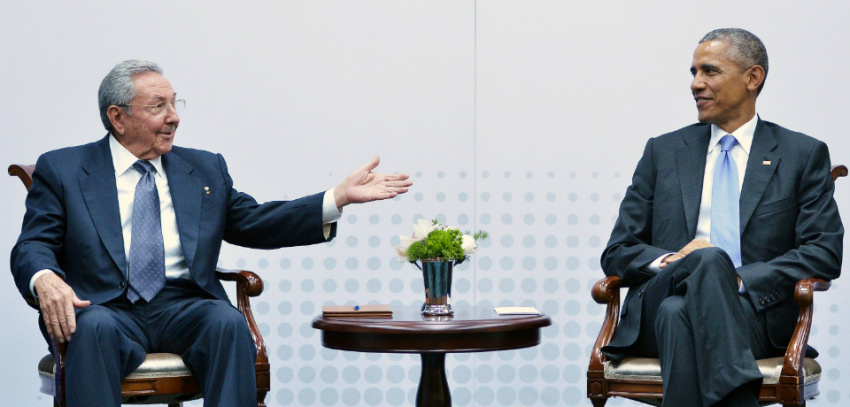Obama and Castro End 50 Years of Silence With Historic Panama Meeting

The meeting at the Summit of the Americas in Panama comes as Castro and Obama have embarked on a process to normalize relations between their estranged nations, a diplomatic rapprochement that if successful would end a vestigial confit of the Cold War.
“This is obviously a historic meeting,” Obama said it its outset. “The history between the United States and Cuba is obviously complicated, and over the years a lot of mistrust has developed. But during the course of the last several months, there have been contacts between the U.S. and the Cuban government. And in December, as a consequence of some of the groundwork that had been laid, both myself and President Castro announced a significant change in policy and the relationship between our two governments.”
During that December announcement, Obama said that the United States would ease some long-standing restrictions on the Cuban economy, and in recent days, administration officials have said that the State Department and other American agencies are nearing a decision on removing Cuba from the list of state sponsors of terrorism. Castro and Obama discussed the terror designation during their meeting, with Obama telling his counterpart that he would make a decision on the issue in “coming days,” according to a senior administration official.
“We are now in a position to move on a path towards the future, and leave behind some of the circumstances of the past that have made it so difficult, I think, for our countries to communicate,” Obama told reporters during his opening remarks.
The talks between Cuba and the United States appear to have mostly bracketed the ideological differences that have poisoned relations between the two countries. On Saturday, Obama and Castro said that they would move forward in a spirit of constructive disagreement.
“I think that everything can be on the table. I think that we can do it, as President Obama has just said, with respect for the ideas of the other. We could be persuaded of some things; of others, we might not be persuaded,” Castro said. “But when I say that I agree with everything that the president has just said, I include that we have agreed to disagree. No one should entertain illusions. It is true that we have many differences. Our countries have a long and complicated history, but we are willing to make progress in the way the president has described.”
“I think what we have both concluded is that we can disagree with the spirit of respect and civility,” Obama said, adding that the opening of embassies in Havana and Washington are key priorities in the short term.
The meeting occurred in a fairly anonymous room of the ATLAPA Convention Center in Panama City, whose most notable feature the White House pool reporter could remark upon was its “very convention-center-like carpeting-blue with lime green geometrical shapes.” The two men sat in wooden chairs. Both dressed in dark suits — Obama in a blue tie, Castro a gray one. Castro had a leather notebook on the table between the two, which had a bouquet of three white roses. The last meeting between the leader of Cuba and the United States occurred in 1956, when Dwight Eisenhower met Fulgencio Batista, the dictatorial leader who fell from power during the Cuban Revolution.
Castro told Obama he wants the U.S. embargo on the island lifted. The two also discussed fugitives both in Cuba and the United States. If the United States opens an embassy in Havana, Obama stressed the need for its diplomats to be able to move freely around the country. According to a senior administration official, the two men spent a significant amount of time discussing their meeting’s historical significance.
But after 50 years of warily eyeing one another across a 90-mile waterway, there was also a sense at Saturday’s meeting that the relationship between Cuba and the United States is not about to reborn overnight. “We are willing to discuss everything, but we need to be patient — very patient,” Castro said. “Some things we will agree on; others we will disagree. The pace of life at the present moment in the world, it’s very fast. We might disagree on something today on which we could agree tomorrow.”
Source: Foreign Policy

